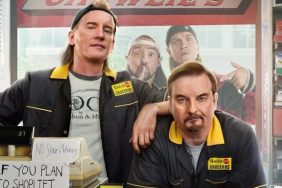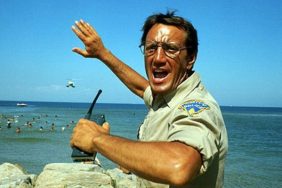The Raven is being released on Blu-Ray October 9th. In it, a serial killer stalks and kills his victims after the deaths he read in Edgar Allan Poe’s short stories. The film boldly suggests that Poe himself, during a period in his life when he was supposedly missing, was secretly aiding the police in the investigation of this killer. That’s a really keen concept, in a “fan fiction” sort of way, and historical events repurposed for exploitation plotlines is always going to be welcome to my eye. It’s also a pretty neat template for a serial killer to follow. Poe, after all, imagined some pretty gruesome deaths in his day, so to see them actually reenacted (outside of a Saw movie) is sweet gory fun.
This got the minds at CraveOnline thinking about movie serial killers in general. Real life has provided some really horrible murders, and real-life serial killers are typically people we don’t think too highly of, but serial killers in movies occupy a strangely more positive space in our minds. They are sympathetic supervillains whom we want to see fail, but also want to see commit horrible acts of violence. We may fear them, but we rarely hate them. They’re the ultimate antiheroes. The killers who fulfill our bloodlust. We are oddly internally grateful when we see an unbalanced person killing whomsoever they please. Like John Doe in Seven, we can only admire their gumption and intelligence. Who cares if they’re leaving a trail of bodies in their wake?
Here, then, is a list of awesome movie serial killers that have, for one reason or another, stuck fast in our minds. Some are scary, some are strong, some are even cool. But they’re all evil murdering weirdos of the highest order.

From Arsenic and Old Lace (dir. Frank Capra, 1944)

I love these old biddies. No one would suspect these calm and well-spoken gentleladies to be serial killers, but serial killers they are. When they meet lonely old men who come to their house looking for a room to let, then determine whether or not he has family, if he’s happy, and if he’s lonely. If the man is all alone in the world, and can only look forward to a death far off in the future, the Brewsters help them out by poisoning their drink. In a weird way, you admire the Brewsters. Sure, they’re killing people without their permission, but they do feel, in a very sweet and innocent way, that they are doing the world a great service. No malice. Ho hate. Just murder. Frank Capra’s darkest film is also one of his funniest.

From The Talented Mr. Ripley (dir. Anthony Minghella, 1999)

In movies, it’s always nice to see smart people thinking clearly and doing what they do best. This is why we love James Bond. Or awesome cops. Or just about any private detective. We like to see awesome people solving problems and being smart. When Patricia Highsmith conceived of the character of Tom Ripley in her books, she sort of inverted that idea by showing us someone who was really good at what they do; only what he was really good at was lying, cheating, killing, and committing just about every sin imaginable. As played in the 1999 film The Talented Mr. Ripley, Tom comes across not as a scheming immoral villain, but as a pasty friendless nerd, largely quiet and insecure, who just wants to be liked, and who kills largely by necessity. Tom Ripley feels like the nerd you were in high school trying to clean up the house after a party, right before the folks get home, only the house is a dead body, and the folks are cops.

From Ted Bundy (dir. Matthew Bright, 2002)

The real-life serial killer Ted Bundy was a classic pervert. He eyeballed young girls and proceeded to capture them and do all manner of horrible things to them. In the 2002 biopic about his life, director Matthew Bright (Freeway) turned his life into a miasma of near-campy and oft-sleazy bouts of poor impulse control. This Ted Bundy (as awesomely played by Michael Reilly Burke) was not a sympathetic outcast, but a completely amoral monster with nice hair and a smirk on his face. He nearly approaches the devil-may-care horror of Alex DeLarge in A Clockwork Orange. Ted Bundy raped and killed many people, and this film offers up a really simple solution as to why: the guy just really liked doing those things.

From This Night I Will Possess Your Corpse (dir. José Mojica Marins, 1967)

Not too many people know about Coffin Joe, as his films are rarely seen outside of his native Brazil. Coffin Joe is the alter ego of the film’s director, José Mojica Marins, sort of the way Elvira lives in movies but also in the real world. Imagine, then, a movie wherein Elvira runs the world, complete with a healthy horror obsession, but whose jokey and campy sense of humor is replaced by an outright hatred for the world, a bleak nihilistic worldview, and blind homicidal rage. Coffin Joe, never seen without his signature top hat or extended fingernails, spent the bulk of his films essentially doing as much evil as he could (including necrophilia and cannibalism), and defying anyone, even God, to stop him. By turns terrifying, campy, and awesome, Coffin Joe is worth researching.

From American Psycho (dir. Mary Harron, 2000)

I grew up in the 1980s, and I always suspected that the power-suit-wearing, slickhaired corporate yuppies were always up to something more sinister than making deals and earning money. Mary Harron’s film version of Bret Easton Ellis’ famous novel proved my suspicions. Evidently, those greedy Reaganauts were secretly serial killers who would openly injure prostitutes, abuse the homeless, and murder whenever the urge struck, which was usually during bouts of quoting trivia about Huey Lewis. As portrayed by Christian Bale, Patrick Bateman is depicted as a supernaturally handsome bundle of wrath and vanity. That he feels nothing but hate for the world shouldn’t surprise us. When his ultra-violent killing begins, it almost feels natural. American Psycho is slick, awesome, terrifying, funny, and a salient comment on the mindset of the 1%.

From Natural Born Killers (dir. Oliver Stone, 1994)

Although most of his recent films have been surprisingly calm and even-handed about their subjects (his most recent film Savages notwithstanding), Oliver Stone still maintains his reputation as a provocateur following films like JFK and Wall Street. His most viscerally challenging film, and certainly his most controversial, Natural Born Killers was intended to be mere a comment on the grossness of American media culture, but became, over the course of its filming, the most whacked-out big-budget experimental film ever shot. The film follows two lost souls, Mickey and Mallory Knox (Woody Harrelson and Juliette Lewis) as they fall in love, and, through their equal inner rage, become the country’s most notorious serial killers. Gleefully sociopathic, Mickey and Mallory killed not only out of rage, but out of a desperate need to raise a middle finger to the American order that we, out here on the outside, laughably call the status quo. And, to be sure, they were also motivated by their pure love for one another. These two were stylish and popular killers, yes, but they were romantics at heart. Bloody, bloody, bloody romantics.

From Peeping Tom (dir. Michael Powell, 1960)

The same year that saw Psycho also saw this wicked little British penny dreadful, also about a serial killer, and also centering very heavily on the notion voyeurism. Mark Lewis (Carl Boehm) is a film nut. He loves movies, and practically lives in his film editing bay. He owns a film camera, which were not often held in 1960. Well-dressed and a bit shy, Mark often found dates. Although, moved by a dark compulsion, Mark would film his dates while he impaled them with a spike extending from his camera’s tripod. Film is death. Mark Lewis is an awkward guy, very much like Norman Bates, driven to capture a certain ecstasy on film. When you consider that all films try to capture some moment of ecstatic truth, then Peeping Tom not only scares and entertains you… but it also implicates you. You, the film says, may also be the killer, just for watching. Wicked fun, that.

From Halloween (dir. John Carpenter, 1978)

Before all the killers in slasher movies were immortal thugs (Jason was brought back to life by a bolt of lightning?), we had more grounded boogeymen like Michael Myers in the original Halloween. Sure, Michael himself would eventually become immortal, but in this first film, he was just a strong silent type who liked to stalk and kill babysitters. Michael could not be reasoned with. He could not be spoken to. He had a task, and he was going to complete it. Not a complex character, but a terrifying one. Consider this: Michael’s own psychiatrist (Donald Pleasance) looked after the kid for many years, and came to conclusion that he was not suffering from any sort of pathology. He was just, rather simply, evil. If that’s not a cool serial killer, I don’t know what is.

From The Silence of the Lambs (dir. Jonathan Demme, 1991)

In what can easily be considered one of the best crime movies ever made, we are treated to two dark and twisted minds. In Buffalo Bill (Ted Levine), we have a transsexual killer who has been – get this – kidnapping chubby girls, starving them to loosen their skin, and then using their skin to make a female suit, essentially transforming him into a woman. He is also a moth enthusiast, and keeps a basement full of bugs and other creepy-crawlies. Sleazy, gross, horrible, he’s the guy you suspect every guy with an unmarked white van to be. And then, of course, we have Hannibal Lecter (Anthony Hopkins), one of the most memorable movie characters in cinema history. Calm, collected, devastatingly intelligent, Lecter seems constantly in control of all situations, even when he’s locked in a remote basement room. He’s the cannibal who we kind of sympathize with. He’s a monster, but, like us, he just can’t abide by rudeness. That guy’s all class.

From M (dir. Fritz Lang, 1931)

A man so horrible, that even other criminals hate him. Hans is a child-killer, which is, even to the German underground, one of the worst castes of criminal society. In the 1931 classic, Hans’ criminal habits unleashed a police crackdown of epic proportions, causing the criminal underworld no end of grief and inconvenience. For the bulk of the film, Hans is hunted by both the cops and by the criminals. He remains largely unseen throughout the proceedings, going about his business somewhere, perhaps actively alluding capture, perhaps oblivious. When we finally see Hans, he is a squat, sweating, squealing little troll played by Peter Lorre. Not exactly a handsome, square-jawed charmer, nor a devilishly intelligent criminal genius. Just a sad, pathetic man living by his dark passions. And yet, that’s what makes him so horrifying. He is not reacting to the world. He is not defying the law. He is not making a statement. He is merely enacting his impulses. He could not do anything else. And he upset the entire legal system. I get chills every time I watch M.
Full Disclosure: This article has beens sponsored by 20th Century Fox.






